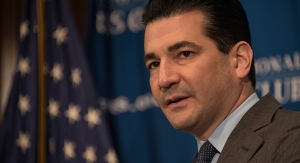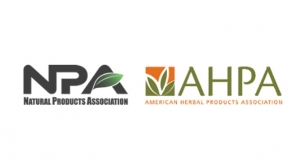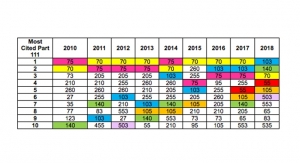04.17.19
A study published in the Annals of Internal Medicine examined the health benefits and risks of dietary supplement use, with the objective of evaluating the association between supplement use, levels of nutrient intake from foods and supplements, and mortality among U.S. adults.
The prospective cohort study examined NHANES (National Health and Nutrition Examination Survey) data from 1999 to 2010, linked to National Death Index mortality data among 30, 899 U.S. adults aged 20 years or older who answered questions on dietary supplement use.
Researchers measured dietary supplement use in the previous 30 days and nutrient intake from foods and supplements. They reviewed participant outcomes for mortality from all causes, including cardiovascular disease (CVD), and cancer.
During a median follow-up of 6.1 years, 3,613 deaths occurred, including 945 CVD deaths and 805 cancer deaths. Use of dietary supplements was not associated with mortality outcomes.
Adequate intake (at or above the Estimated Average Requirement or the Adequate Intake level) of vitamin A, vitamin K, magnesium, zinc, and copper was associated with reduced all-cause or CVD mortality, but the associations were restricted to nutrient intake from foods.
Excess intake of calcium, however, was associated with increased risk for cancer death, and researchers suggested the association seemed to be related to calcium intake from supplements.
The study concluded that the use of dietary supplements is not associated with mortality benefits among U.S. adults.
NPA Response
Commenting on the study, the Natural Products Association called the study “fake science,” as it “observed an unhealthy patient population—including cancer survivors and people in generally poor health—to make misleading claims about the health benefits of nutritional supplements.”
“This is fake science and it’s spreading misleading information to the general public,” said Daniel Fabricant, PhD, president and CEO of NPA. “The first line of defense against disease is a balanced healthy lifestyle, and supplements are important for the vast majority of Americans who may not receive the recommended daily nutrients from diet alone.”
Poor diet in those already diagnosed with cancer in the past was a major confounder in the study, NPA suggested. The organization said participants were more likely to be cancer survivors, smokers, physically inactive, diabetic, and in poor general health. The trend toward higher risk of death with an increasing number of supplements was not statistically significant in the sample size of 30,000.
Furthermore, NPA noted the use of vitamin E supplements in combination with multivitamins was associated with lower risk of death.
NPA stressed that Americans are undernourished, as:
The prospective cohort study examined NHANES (National Health and Nutrition Examination Survey) data from 1999 to 2010, linked to National Death Index mortality data among 30, 899 U.S. adults aged 20 years or older who answered questions on dietary supplement use.
Researchers measured dietary supplement use in the previous 30 days and nutrient intake from foods and supplements. They reviewed participant outcomes for mortality from all causes, including cardiovascular disease (CVD), and cancer.
During a median follow-up of 6.1 years, 3,613 deaths occurred, including 945 CVD deaths and 805 cancer deaths. Use of dietary supplements was not associated with mortality outcomes.
Adequate intake (at or above the Estimated Average Requirement or the Adequate Intake level) of vitamin A, vitamin K, magnesium, zinc, and copper was associated with reduced all-cause or CVD mortality, but the associations were restricted to nutrient intake from foods.
Excess intake of calcium, however, was associated with increased risk for cancer death, and researchers suggested the association seemed to be related to calcium intake from supplements.
The study concluded that the use of dietary supplements is not associated with mortality benefits among U.S. adults.
NPA Response
Commenting on the study, the Natural Products Association called the study “fake science,” as it “observed an unhealthy patient population—including cancer survivors and people in generally poor health—to make misleading claims about the health benefits of nutritional supplements.”
“This is fake science and it’s spreading misleading information to the general public,” said Daniel Fabricant, PhD, president and CEO of NPA. “The first line of defense against disease is a balanced healthy lifestyle, and supplements are important for the vast majority of Americans who may not receive the recommended daily nutrients from diet alone.”
Poor diet in those already diagnosed with cancer in the past was a major confounder in the study, NPA suggested. The organization said participants were more likely to be cancer survivors, smokers, physically inactive, diabetic, and in poor general health. The trend toward higher risk of death with an increasing number of supplements was not statistically significant in the sample size of 30,000.
Furthermore, NPA noted the use of vitamin E supplements in combination with multivitamins was associated with lower risk of death.
NPA stressed that Americans are undernourished, as:
- 13.1 million children lived in food-insecure households in 2015;
- 80% of Americans don’t receive the daily recommended nutrients from diet alone;
- Over 50% of American children don’t get enough vitamins D and E;
- Over 25% of American children don’t get enough calcium, magnesium or vitamin A.



















